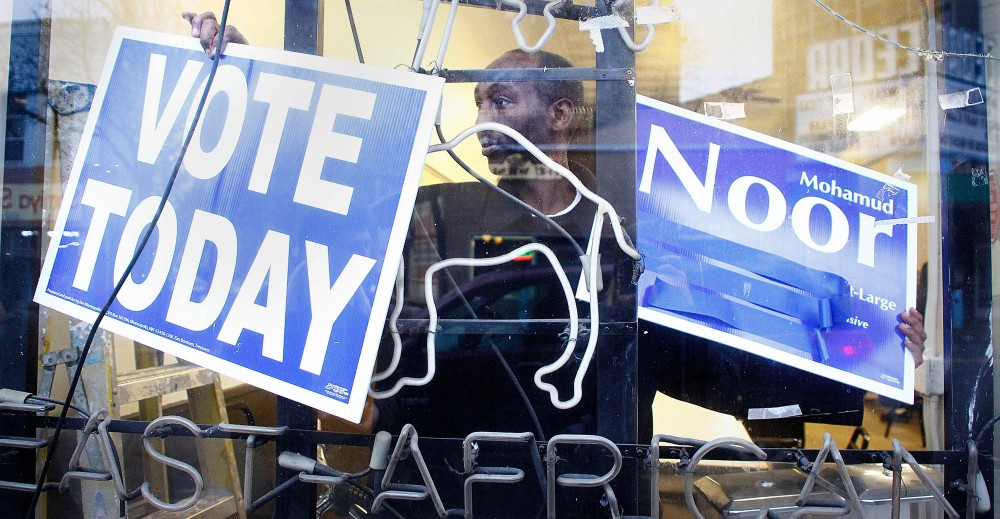As Mohamud Noor walked the streets of the Cedar-Riverside neighborhood Sunday, locals flocked to greet, hug and kiss him.
Last Tuesday, he fell 340 votes short of grabbing the Democratic-Farmer-Labor nomination in the Senate District 59 primary.
With the nomination, Noor would likely have won the general election in January, making him the nationâÄôs first Somali state senator.
Cedar-Riversideresidents flooded polling places in hopes of electing Noor, a Somalia native.
More voters cast their ballots in the precinct that includes the Riverside Plaza apartment complex than any other precinct in Senate District 59. Of the 580 who voted, 554 chose Noor âÄî those votes were more than a third of his total.
Voter turnout in that same precinct was ninth-worst among the districtâÄôs 25 precincts in the 2010 gubernatorial election, according to Minnesota Secretary of State data.
In the end, Noor lost the DFL primary to Kari Dziedzic, who captured 32 percent of the vote. Dziedzic will likely go on to win the general election Jan. 10, when sheâÄôll face Republican contender and Augsburg College student Ben Schwanke.
Though he wonâÄôt be in the Legislature come January, Noor said he has seen his campaignâÄôs impact on the community.
âÄúThe loss has actually energized more people. I think theyâÄôre more energized than I am,âÄù he said. âÄúPeople are getting involved with the redistricting process they didnâÄôt even know was happening before.âÄù
Osman Ahmed, chairman of the West Bank Community Coalition, stressed the turnoutâÄôs importance.
âÄúIt was a really big challenge in terms of new immigrants who had never had elections back home. Many of them had never voted at all,âÄù he said. âÄúIt was a really big time for us.âÄù
NoorâÄôs campaign team had initially hoped to get 1,000 votes from the Cedar-Riverside precinct, said Nimco Ahmed, his co-campaign manager.
Nimco Ahmed said the campaign team knocked on every door in the weeks approaching the primary. They knocked on the doors again at least four to five times on primary day, using a âÄúknock and dragâÄù tactic: knock on
the door and drag them to vote.
âÄúWe made sure that everybody that was home went to the polls.âÄù
Twelve years of service
Although born in Somalia, Noor was raised in Kenya by his mother and father âÄî a businessman, who Noor said taught him the importance of education. That stuck with him when he came to the U.S. as a 22-year-old in 1999.
On just his second day living in America, he got a job at MacyâÄôs department store in the Mall of America.
Driven by a rigorous workethic and a desire to help other immigrants, Noor has spent the past 12 years in a multitude of jobs, colleges and community organizations.
Before coming to the U.S., Noor had never used a computer. He taught himself while working for Hennepin County in the eligibility department for social services.
At the same time, he was going to school at Minneapolis Community and Technical College and then Metropolitan State University in St. Paul, where he earned a bachelorâÄôs degree in computer science.
As he rose through the ranks at Hennepin County, then-Gov. Jesse Ventura appointed Noor to be the first-ever representative for the East-African community on the Council on Black Minnesotans. Former Gov. Tim Pawlenty appointed him to a second term.
After various consulting jobs and briefly owning his own small business, Noor began working for the stateâÄôs Department of Human Services, where he stayed until he entered the race for the Senate District 59 special election in early November.
âÄúMy work was calling me minutes after the [primary] to go back,âÄù he said.
Noor went back to work this week.
âÄòHe couldâÄôve changed the communityâÄô
Although he has never lived in the Cedar-Riverside area, Noor said he has worked in the neighborhood since he came to America. He speaks five languages: Oromo, Swahili, Somali, Amharic and English.
As he walked around the neighborhood Sunday, residents greeted Noor as if he was close family. They spoke warmly with him and even though the campaign stopped last week, Noor didnâÄôt hesitate to greet everyone on the street with a smile and hug, stopping to pick up and kiss young children. One man yelled âÄúI support you, Mr. Noor!âÄù as he crossed the street.
âÄúHe couldâÄôve changed the community to the way it needs to be,âÄù said Hesen Shire, a local business owner who supported and voted for Noor. âÄúWe need more education. If we donâÄôt have education, we donâÄôt have eyes.âÄù
Noor didnâÄôt rule out running for another office again, but if it were up to his wife, that wouldnâÄôt happen.
âÄúâÄòNo more running,âÄô she told me,âÄù Noor said laughing. âÄúItâÄôs all about family.âÄù
Noor has three kids, including a 6-month-old girl. If he doesnâÄôt try his hand at politics again, Noor is sure someone else in the neighborhood will step up.
âÄúThis showed that it was possible that somebody from their community could run and have a chance,âÄù Noor said. âÄúWe are opening the doors to show them that they can run for office. ThatâÄôs what they need: Motivation, inspiration, and I hope that we did that with this.âÄù







